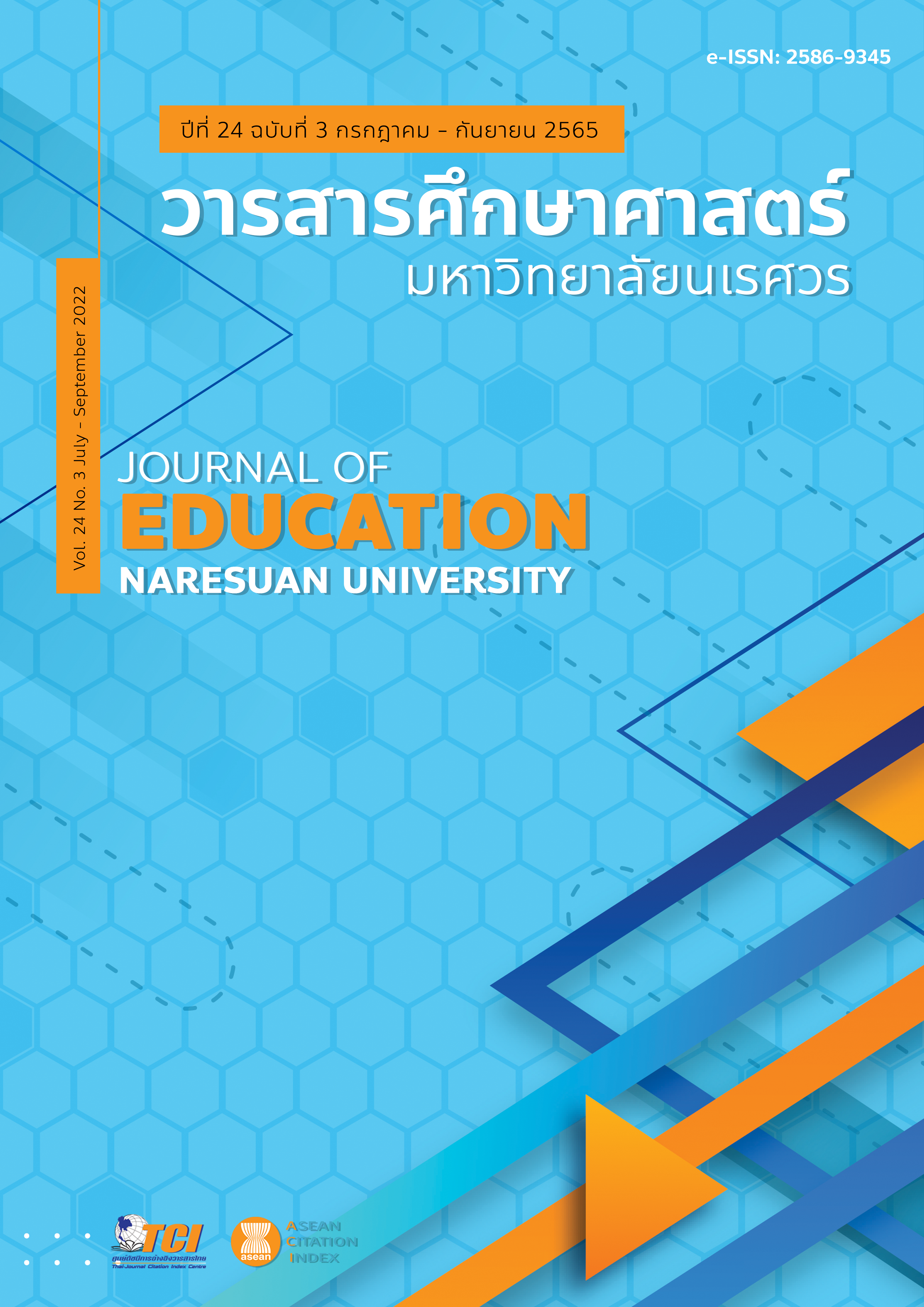A MULTILEVEL STRUCTURAL EQUATION MODELING OF FACTORS OF SCHOOL AND PERSONAL S’ LEVEL ON ELEMENTARY TEACHERS’ INNOVATIVE BEHAVIOR, THE OFFICE OF BASIC EDUCATION COMMISSION แบบจำลองความสัมพันธ์พหุระดับปัจจัยระดับโรงเรียนและระดับบุคคลที่มีอิทธิพลต่อพฤติกรรมนวัตกรรมของครูประถมศึกษาสำนักงานคณะกรรมการการศึกษาขั้นพื้นฐาน
Main Article Content
Abstract
The objectives of this research were to study 1) the personal level, open-mindedness, originality and education innovative attitude influenced to elementary innovative behavior in the office of basic education commission and 2) the school level, innovative leadership, education innovative climate and education innovative organization influence to elementary innovative behavior in the office of basic education commission. The testing result from the multilevel structural modeling fitted with empirical data (2=92.02, df=63, CFI=0.98, TLI=0.96, RMSEA=0.04) and the research found that 1) The personal level, open-mindedness, originality and education innovative attitude had significantly direct effect on elementary innovative behavior and three factors can predict elementary innovative behavior at 56 percent. The education innovative climate had significantly direct and indirect effect by and education innovative attitude on teachers’ innovative behavior. 2) The school level, innovative leadership had direct and indirect effect by and education innovative attitude on teachers’ innovative behavior and it can predict elementary innovative behavior at 34 percent.
Article Details

This work is licensed under a Creative Commons Attribution-NonCommercial-NoDerivatives 4.0 International License.
The owner of the article does not copy or violate any of its copyright. If any copyright infringement occurs or prosecution, in any case, the Editorial Board is not involved in all the rights to the owner of the article to be performed.
References
Agarwal, R., Angst, C. M., & Magni, M. (2009). The performance impacts of coaching: A multilevel analysis using hierarchical linear modeling. International Journal of Human Resource Management, 20(10), 2110–2134.
Chen, G., Mathieu, J. E., & Bliese, P. D. (2004). A Framework for conducting multi-level construct validation. Organizational Behavior and Processes Research in Multi-Level Issues, 3, 273-303.
Chuayounan, S. (2016). A multilevel structural equation modeling of the managerial coaching on work behavior based on the concept of Thailand education criteria for performance excellence of government universities’ academic support staffs in Thailand (Doctoral dissertation). Bangkok: Srinakharinwirot University. [in Thai]
Fangguo, S. F., & Zhang, J. (2020). Proactive personality and innovative behavior: A moderated mediation model. Social Behavior and Personality: An International Journal, 48(3), e8622.
Hirunchalothorn, P., & Sumalee, S. (2018). Development of learning management innovation to develop students’ thinking skills in elementary level. Silpakorn Educational Research Journal, 10(1), 44-60. [in Thai]
Khantipongpunthu, K. (2018). Influence of transformative leadership and sustainable organization on innovative behavior: A case study of employee of Somboon Group. Humanities and Social Science Research Promotion Network Journal, 1(3), 45-57. [in Thai]
Maas, C. J. M., & Hox, J. J. (2005). Sufficient sample sizes for multilevel modeling. European Journal of Research Methods for the Behavioral and Social Sciences, 1(3), 86-92.
Nimnaparoj, T. (2019). Perception of supervisor management and social support with the performance of personnel Service Support department at Thammasat University Hospital. RMUTL Journal of Business Administration and Liberal Art, 7(1), 64-74. [in Thai]
Office of the Basic Education Commission. (2018). The school information of Phayao’s Office of the Basic Education Commission. Retrieved July 23, 2018, /from/http://data.bopp-obec.info/emis/ school.php?Area_CODE=5601 [in Thai]
Önhon, Ö. (2019) The relationship between organizational climate for innovation and employees’ innovative work behavior: ICT sector in Turkey. Vezetéstudomány - Budapest Management Review, 50(11), 53-64. https://doi.org/10.14267/VEZTUD.2019.11.04
Panyudod, S. (2016). Leadership characteristics of administrators affecting knowledge management in educational institutions under the jurisdiction of Ratchaburi Primary Educational Service Area Office 2. Journal of Thai Interdisciplinary Research, 11(4), 34 – 40. [in Thai]
Preacher, K. J., Zyphur, M. J., & Zhang, Z. (2010). A general multilevel SEM framework for assessing multilevel mediation. Psychol Methods, 15(3), 209-233.
Promchart, K., & Potipiroon, W. (2020). Examining the influence of leadership of primary school principals in the three southernmost provinces on teachers’ task performance and the mediating role of trust: A multilevel mediation model. Journal of Behavioral Science, 26(1), 61-81. [in Thai]
Robbins, S. (1993). Organizational behavior: concepts, controversies and applications (6th ed.). New Jersey: Prentice Hall.
Sornadisak, K., & Akkawanitcha, K. (2018). Antecedents and consequence of Bangkok employee innovative behavior in NakornPathom. Veridian E-Journal, Silpakorn University, 11(2), 1531-1545. [in Thai]
Srimanee, P., & Potipiroon, W. (2020). Factors affecting individual innovative behavior: The case of support staff in Prince of Songkla University (Hat Yai Campus). Retrieved May 23, 2020, /from/http://kb.psu.ac.th/psukb/bitstream/2016/12339/1/%E0%B8%9B%E0%B8%B1%E0%B8%97%E0%B8%A1%E0%B8%B2%20%E0%B8%A8%E0%B8%A3%E0%B8%B5%E0%B8%A1%E0%B8%93%E0%B8%B5.pdf. [in Thai]
Sutthawart, W., & Pasunon, P. (2015). Factors affecting individual innovative behavior in the Office of Basic Education Commission. Veridian E-Journal, Silpakorn University, 8(1), 530-545. [in Thai]


